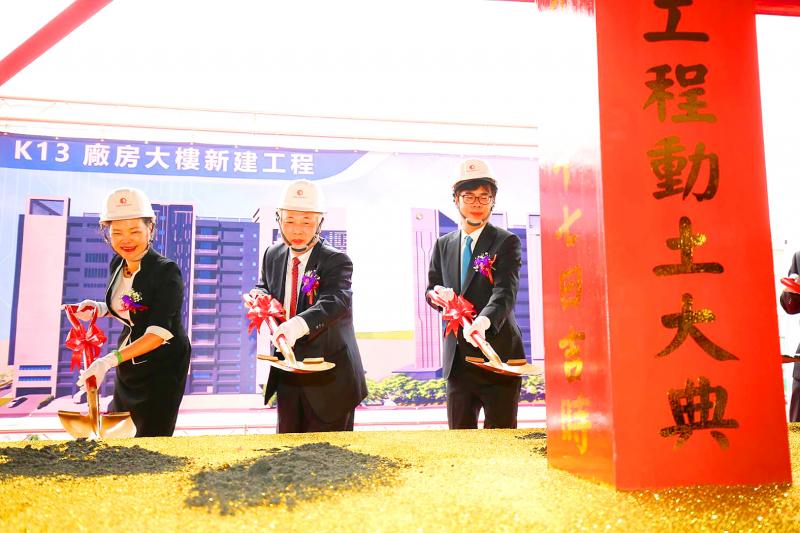ASE Technology Holding Co (ASE, 日月光投控), the world’s biggest chip tester and packager, yesterday said it would invest NT$26 billion (US$880.58 million) in a new fab in Kaohsiung to expand advanced testing and packaging capacity for 5G-related chips.
The new fab, code-named K13, is part of the company’s broader plan to build six fabs in Taiwan within five years, ASE said.
As rapidly developing 5G technology is stimulating demand for semiconductors, ASE said it is stepping up investment and adding advanced technology capacity to capture the “explosive” growth of the supply chain.

Photo: Lee Hui-chou, Taipei Times
“5G is a new technology, which is to bring explosive growth to businesses. ASE would continue to invest in advanced process technologies and hire research and development experts in Kaohsiung to capitalize on this opportunity for the semiconductor industry,” ASE chief executive officer Tien Wu (吳田玉) said in a statement.
ASE is positive about its long-term prospects in the semiconductor industry, as 5G technology, artificial intelligence, smart manufacturing and electric vehicles are likely to drive semiconductor growth over the next few years, Wu said in June.
The company plans to invest NT$8 billion in fab construction and add another NT$18 billion for further capacity expansion. The fab is scheduled to become operational in 2023.
The K13 fab is forecast to contribute US$500 million a year to revenue and create 2,800 jobs when it reaches full capacity, the Kaohsiung-based company said.
For this year, the company plans to spend US$1.6 billion on new facilities and equipment, on par with last year’s level, while its global peers scaled back capital spending by a combined US$700 million, it said.
The capacity expansion plan came as ASE runs most of its factories at, or near full capacity, thanks to strong demand, mostly from its communications segment, the company told investors on July 31.
The company said it expects revenue from its core chip assembly, testing and material business this quarter to grow 5 percent quarterly.
However, overall revenue this quarter would still face the effects of US restrictions on using US technology and software to produce chips abroad, it said.
The US restrictions are to take effect on Sept. 14.

In Italy’s storied gold-making hubs, jewelers are reworking their designs to trim gold content as they race to blunt the effect of record prices and appeal to shoppers watching their budgets. Gold prices hit a record high on Thursday, surging near US$5,600 an ounce, more than double a year ago as geopolitical concerns and jitters over trade pushed investors toward the safe-haven asset. The rally is putting undue pressure on small artisans as they face mounting demands from customers, including international brands, to produce cheaper items, from signature pieces to wedding rings, according to interviews with four independent jewelers in Italy’s main

Japanese Prime Minister Sanae Takaichi has talked up the benefits of a weaker yen in a campaign speech, adopting a tone at odds with her finance ministry, which has refused to rule out any options to counter excessive foreign exchange volatility. Takaichi later softened her stance, saying she did not have a preference for the yen’s direction. “People say the weak yen is bad right now, but for export industries, it’s a major opportunity,” Takaichi said on Saturday at a rally for Liberal Democratic Party candidate Daishiro Yamagiwa in Kanagawa Prefecture ahead of a snap election on Sunday. “Whether it’s selling food or

CONCERNS: Tech companies investing in AI businesses that purchase their products have raised questions among investors that they are artificially propping up demand Nvidia Corp chief executive officer Jensen Huang (黃仁勳) on Saturday said that the company would be participating in OpenAI’s latest funding round, describing it as potentially “the largest investment we’ve ever made.” “We will invest a great deal of money,” Huang told reporters while visiting Taipei. “I believe in OpenAI. The work that they do is incredible. They’re one of the most consequential companies of our time.” Huang did not say exactly how much Nvidia might contribute, but described the investment as “huge.” “Let Sam announce how much he’s going to raise — it’s for him to decide,” Huang said, referring to OpenAI

The global server market is expected to grow 12.8 percent annually this year, with artificial intelligence (AI) servers projected to account for 16.5 percent, driven by continued investment in AI infrastructure by major cloud service providers (CSPs), market researcher TrendForce Corp (集邦科技) said yesterday. Global AI server shipments this year are expected to increase 28 percent year-on-year to more than 2.7 million units, driven by sustained demand from CSPs and government sovereign cloud projects, TrendForce analyst Frank Kung (龔明德) told the Taipei Times. Demand for GPU-based AI servers, including Nvidia Corp’s GB and Vera Rubin rack systems, is expected to remain high,